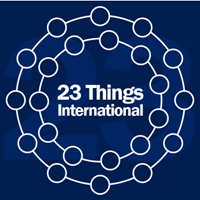
Between March and June this year, the annual 23 Things International programme brought together researchers from around the world. We’re celebrating a successful running of this unique project and wanted to share a few of our highlights.
23 things has contributed in helping me to find my feet in the academic world
23T is a collaboration between universities in the UK, New Zealand, Ireland, Australia and Bahrain, as well as the Africa Research Excellence fund. Originally it was a Surrey in-house scheme to introduce engineering Postgraduate Researchers (PGRs) to a range of public engagement and profile-building activities. Each week we released a blog (or ‘Thing’) asking people to think of some tool or aspect for general research, such as bibliometrics, social media for academics, infographics, writing a blog or publishing strategy.
I am pleased with the breadth of topics that were covered and the content that was covered, in a very succinct and easy to ‘consume’ format.
The international version happened almost by accident after a chance meeting with the wonderful Kwong Nui Sim, an expert on how researchers use (or fail to use) IT for their work. She was based at Otago University, New Zealand: “This sounds like a fun programme; why don’t we collaborate on an international version?” Since then we’ve grown every year to include institutions around the world and participants from at least 30 different countries.
Now we have a ‘pod’ system that matches up researchers with similar interests, creating an instant global network and encouraging participants to meet and work together on small tasks or discussions. Although meeting across time zones can be a challenge, it’s a wonderful way to connect and learn about how things are done in different countries. The pods meet online using a range of platforms and are supported by an Engagement Mentor (this year Surrey’s own Jeetendra Sahani).
[The Engagement mentor was able to] provide guidance and support based on their experience and expertise. They can offer advice, share insights, and help navigate challenges or decision-making processes.
For 2023 we had a record 535 (!) participants including around 70 PGRs and Early Career Researchers (ECRs) from Surrey, working together with colleagues at Cambridge, Royal Holloway, Swansea, University College Dublin, Kings College, London, Otago, Auckland University of Technology, Avondale University, University of Bahrain (our partner organisations) plus such centres as KNUST, Makerere University, the Uganda Virus Research Institute, University of Technology Iraq, London School of Hygiene and Tropical Medicine, Covenant University, University of Brighton, to name but a few.
Meeting other researchers of like mind, coming across some research terms and information all make this programme worth it.
Each year we include new topics in the ‘Things’ to keep pace with key issues facing researchers. New for 2023 included a discussion of using AI in research (whatever your discipline), assessing and managing your online presence, and decolonising research. All the content is written by academics and professionals with relevant expertise.
I have learned a lot of new things related to research and career development
The highlights for me are always the introductions meetings and our unique 48-hr virtual writing retreat. Getting to meet new participants and hear about their work is inspiring, and there’s a wonderful energy as people set up their meetings and explore the forum. We had a new website this year which looks a lot better than the old version. Live events such as the writing retreat also help to build a border-spanning community – though there’s always a desire for more of this! (Any brilliant ideas?)
Having organised the programme for the past five years I love hearing about unexpected light-bulb moments from the blogs, or new friendships forged through the pods. For next year we will be welcoming yet more new partners, including universities in Australia, the UK, and hopefully Europe and South-East Asia. Look out for updates – and hopefully we’ll see you in March!
Dr Mike Rose
